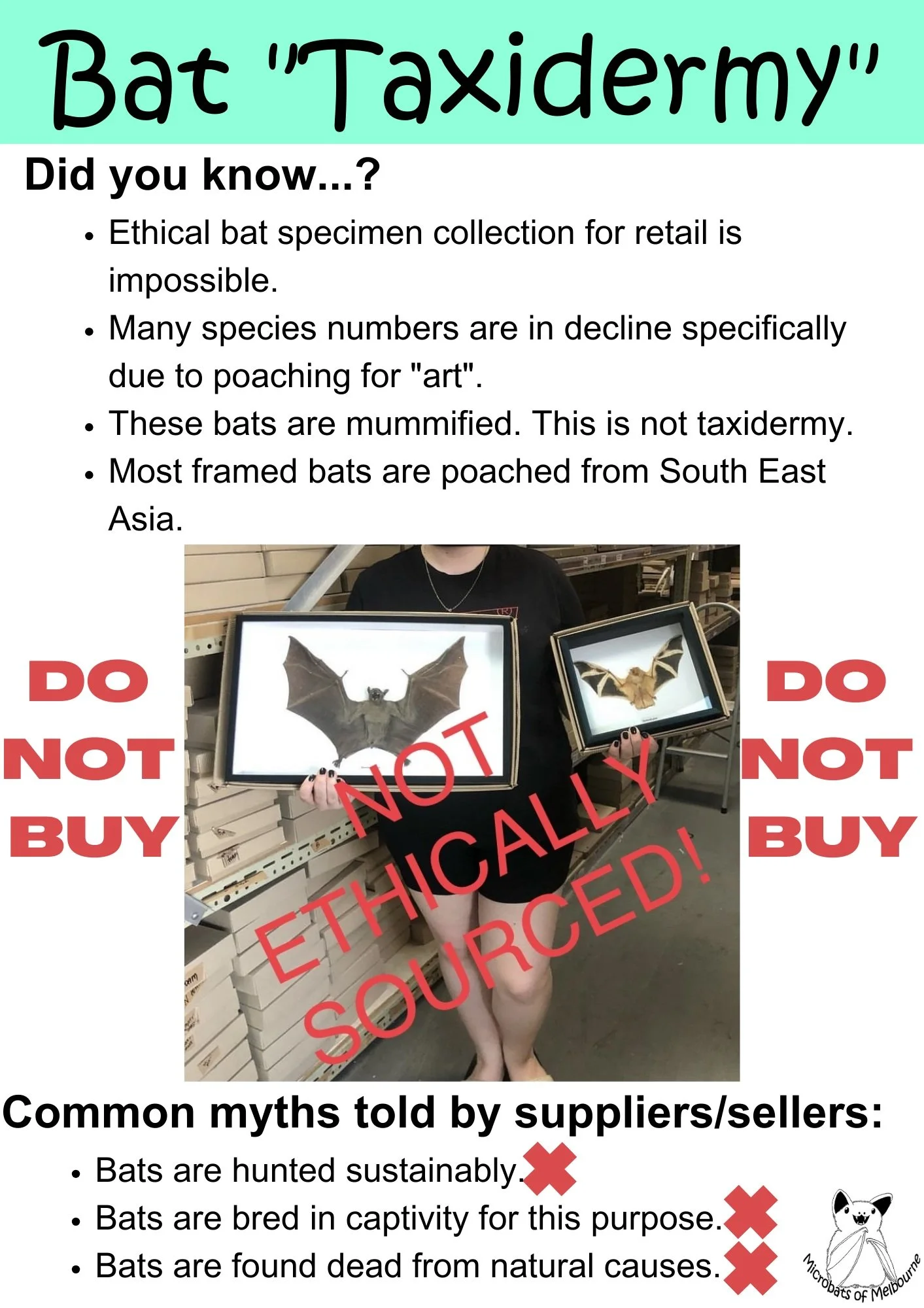Our Projects
Call for 24hr vets to have vaccinated staff
By the very nature of our work, many of the bats we are called to are inured in a way that would not be compatible with life in the wild. In these circumstances we need vets to be available to perform emergency euthanasia to prevent the suffering of these animals. Currently in Victoria we have extremely limited options outside of business hour as most 24hr vets refuse to see bats due to the risk of Australian Bat Lyssavirus (ABLV). ABLV is prevented through vaccination and we are asking 24hr emergency vet clinics to have vaccinated staff so that our animals can have their suffering ended when necessary.
Ericka is currently in communication with the Veterinary Practitioners Registration Board of Victoria, DEECA, and the Animal justice Party in regards to this matter.
We have a petition where you can show your support for our cause:
Update: March 2024
The Veterinary Practitioners Registration Board Of Victoria released their March newsletter addressing the treatment of bats. In the newsletter they state that only vaccinated veterinary staff should treat bats. They do no address the concerns I raised with them, nor do they indicate any action into increasing the number of vaccinated vets in the state to facilitate the emergency treatment of bats. In short, the Vet Board plan to continue as normal, and we bat carers and rescuers must continue with extremely limited veterinary support.
Rest assured, Ericka will not stop her fight to see veterinary support for injured bats improve.
(read here, March 2024, page 8) https://www.vetboard.vic.gov.au/VPRBV/VPRBV/Vets/Newsletter.aspx
Stop the import of decorative bat carcasses
Many people, understandably, find taxidermy fascinating, so when the chance to purchase a bat specimen in a frame comes up, they take it. Unfortunately, bats in frames are not taxidermy and as such do not follow the same regulations as licensed taxidermy pieces do. Bats in frames are often sourced from mass suppliers in South East Asia where the animals are hunted for the purpose of export. Suppliers will often say the animals are sourced ethically but there are a few reasons why this is impossible; bats breed far too slow for any captive programs to be possible, and the shear quantities that are available for purchase disproves the notion that these animals have been found in the wild after dying of natural causes. Their bodies are also posed and in pristine condition, further disproving the idea that they were found already deceased.
The truth is that these specimens are mummified bat carcasses that have been hunted in the wild. Some species are seeing a noted decrease in wild population sizes directly linked to this poaching activity.
Legitimate taxidermy artists do not support the use of real bats.
Ericka is actively trying to educate retailers on the truth behind bat specimens so if you see bats for sale in Australia please get in touch via email or social media. She also plans on bringing this issue up to the federal government in the hopes of achieving a ban on importing these specimens.
If you love bats we would advise to NEVER purchase bat specimens. If you enjoy the world of taxidermy, look into artists that design and make 3D printed specimens, or those that use artificial material substitutes.
UPDATE: September 2024
Recent communications with the Department of Agriculture, Fisheries and Forestry, Biosecurity Animal Division of the federal government, we have discovered that bats are breaching the importation regulations required by the Australian Government. This means that the specimens coming in to Australia are not being decontaminated appropriately. This carries major concerns for the biosecurity of Australia, for humans, wildlife, and plants.
Ericka is continuing to speak with Biosecurity to address this issue.

